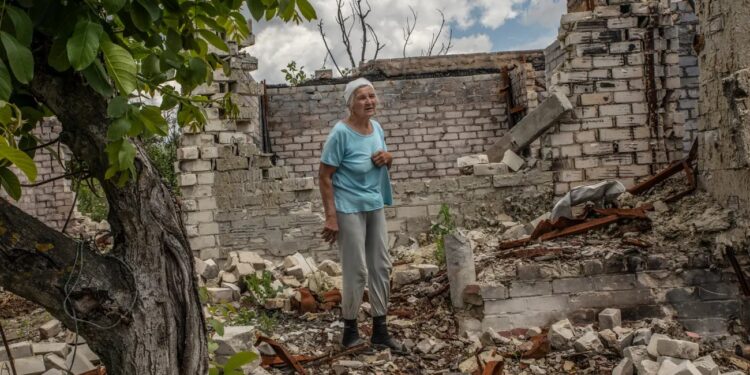Every morning, when Vira Chernukha wakes up amid the rubble of what is left of the Ukrainian village of Dementiivka after seven months of Russian occupation, the first thing she does is curse Vladimir Putin. Once a peaceful settlement of dozens of small houses, charming flower gardens and the sounds of children playing, the village now has only one remaining resident, Chernukha, 76, along with two stray puppies and a cat. The others either died in the shelling or moved to Russia, about 5 miles away.
“We had such a beautiful village you can’t even imagine,” she says in tears. “You could hear children’s voices everywhere. Beautiful! And now it’s a dead zone. No one’s here.”

For Russia, Dementiivka, with a pre-war population of about 60, was a crucial point on the road from its border region of Belgorod to Kharkiv, Ukraine’s second-largest city, and gave it control of a key supply line. Russia first occupied the village in March 2022, days into the Kremlin’s full-scale invasion, lost it weeks later to Ukrainian forces and then captured it again that May in an assault using heavy artillery. A rocket destroyed Chernukha’s house, leaving her with a seriously wounded leg.

“I had a piece of shrapnel in my hip,” she recalls. “It was big. I have a huge scar and it still hurts. I don’t think I’ll ever fully recover from this wound. The Russians moved me to a hospital in Belgorod. They brought me there while I was unconscious. They wanted to send me to some refugee camp in Rostov, but I wanted to go back home. I’m Ukrainian, born and raised in Ukraine. When I said this to the doctor, he said their soldiers were in my village and that I couldn’t go back.”
After a few days in the hospital, however, Chernukha managed to get in touch with her daughter. She had no intention of staying in Russia and was ready to put her own life in danger by fleeing with a group of volunteers to Europe.https://interactive.guim.co.uk/uploader/embed/2023/07/ukraine_dementiivka/giv-13425wWDI1E76QT40/
“My daughter got a hold of some volunteers that helped me to leave,” she says. “It took eight days to go from Belgorod through Latvia, Lithuania and Poland. But, like I said, I wanted to go back to Ukraine, so I travelled to Lviv, then to Vinnytsia, where I remained for some time until it was safe to return back home.”
Ukraine’s counteroffensive in the Kharkiv region last September, which took the Russian troops by surprise and forced them to quickly withdraw from large areas of previously occupied territory, saw it retake Dementiivka. What is left of the village is now in the hands of Kyiv. But like all the buildings in the settlement, Chernukha’s house that she had built with her husband in 1999 is totally destroyed.
“We built it with our own hands,” she says. “I made concrete and he laid bricks. Step by step we built it all. How can I leave it?”

Vira had taken the long and dangerous journey from Russia for one and only one reason: to return to Dementiivka. Her daughter used her modest savings to help Chernukha to rebuild part of her house, equipping it with the essentials: a wood-burning kitchenette, a bed and a tiny bathroom.
As for the garden around the house, dotted with deep craters, Chernukha has covered them with earth and planted colourful flowers, slowly trying to take back everything the Russians took from her.
“Before the Russians came, I had beautiful apple trees”, she says. “Now it’s all gone. They ruined it all. My poor apple tree.”

She returned to live in her beloved village on 9 May, exactly one year after she was forced to leave, where she is now the only resident. Many of the inhabitants were natives of Belgorod, and after the invasion they moved to Russia. Among them were alleged collaborators. At least 10 inhabitants died in the fighting.
When the Russians fled, they did not have time to take all their weapons with them and left large amounts of equipment behind. In a corner of her garden, Vira has accumulated grenades, crates of ammunition, bullets and helmets she found on her land. Fearing a Ukrainian assault, the Russian soldiers also left landmines – hiding hundreds in gardens, streets and even inside homes.
“You have to be careful where you put your feet here,” she says. “They told me that they also mined the road that leads to the cemetery. But I don’t care. I go to visit my husband there every day. He died in 2021, just before the invasion. If he had been alive, they would have killed him at once. Because he hated Russians, he hated them with all his heart. If my husband could come out of his grave and see what they did to our home, he would drop dead again.”
Chernukha survives with a generator for electricity and a water pump. Once a week, Viktoriia Kolodochka, mayor of the local area, brings her groceries and some clothes.
“In this whole area, there once lived around 2,000 people across about 10 villages,” says Kolodochka. “Today there are just under 260 left. I try to take care of the few remaining inhabitants, the majority of whom are very elderly. But while people in other villages have someone to talk to, Vira, whose two sons visit from time to time, is literally on her own.”
“I’m not scared,” Chernukha says. “Why should I be scared? I’ve lived long enough anyway. I go to bed early and when I get up every morning, I curse Putin. Every single morning I curse him. I wish he would turn in his coffin a million times over.”
“This is all his fault,” she adds. “We had such a beautiful village. And now? Now there’s nothing left.”
Source: The Guardian




Recent Comments